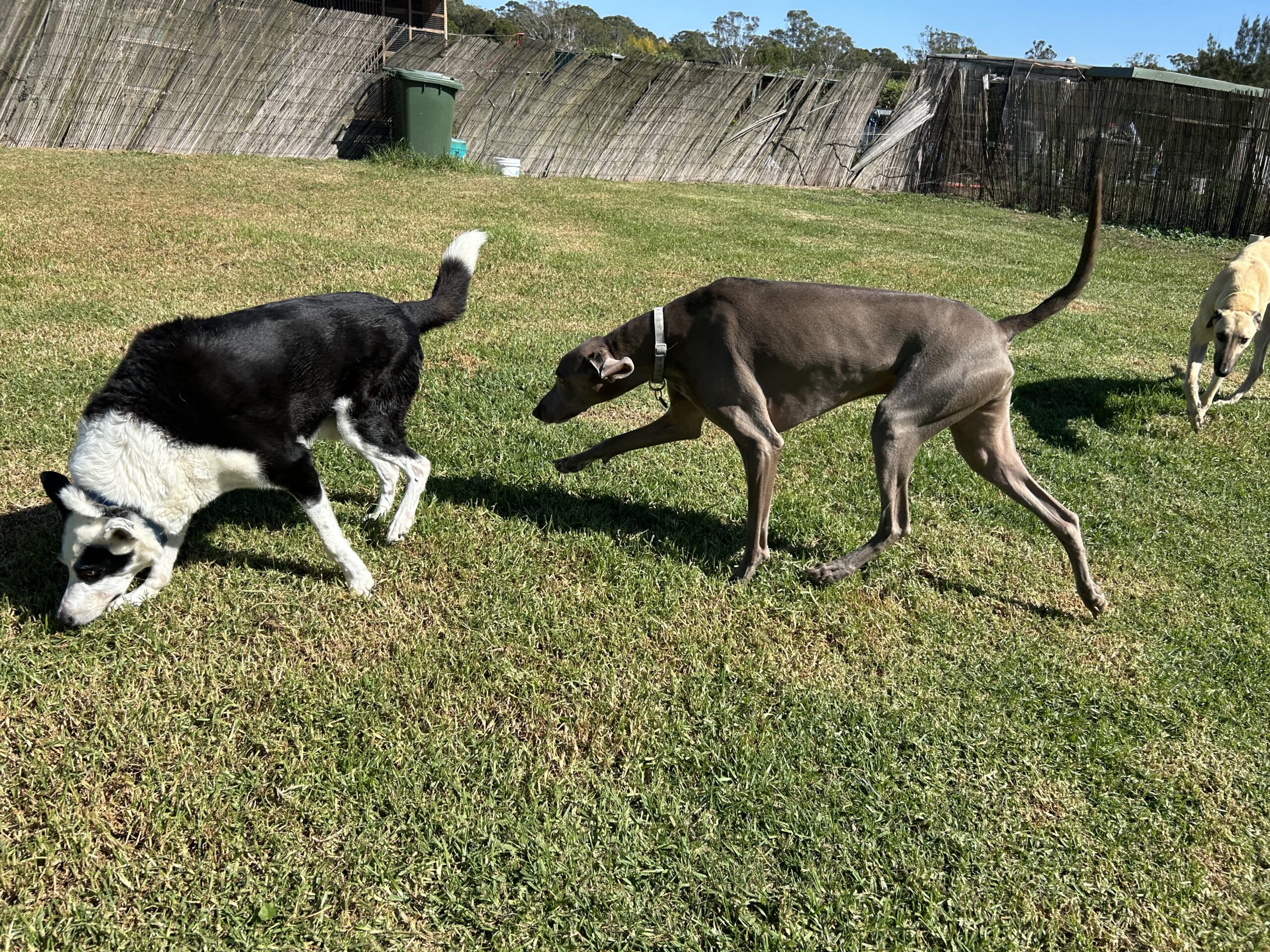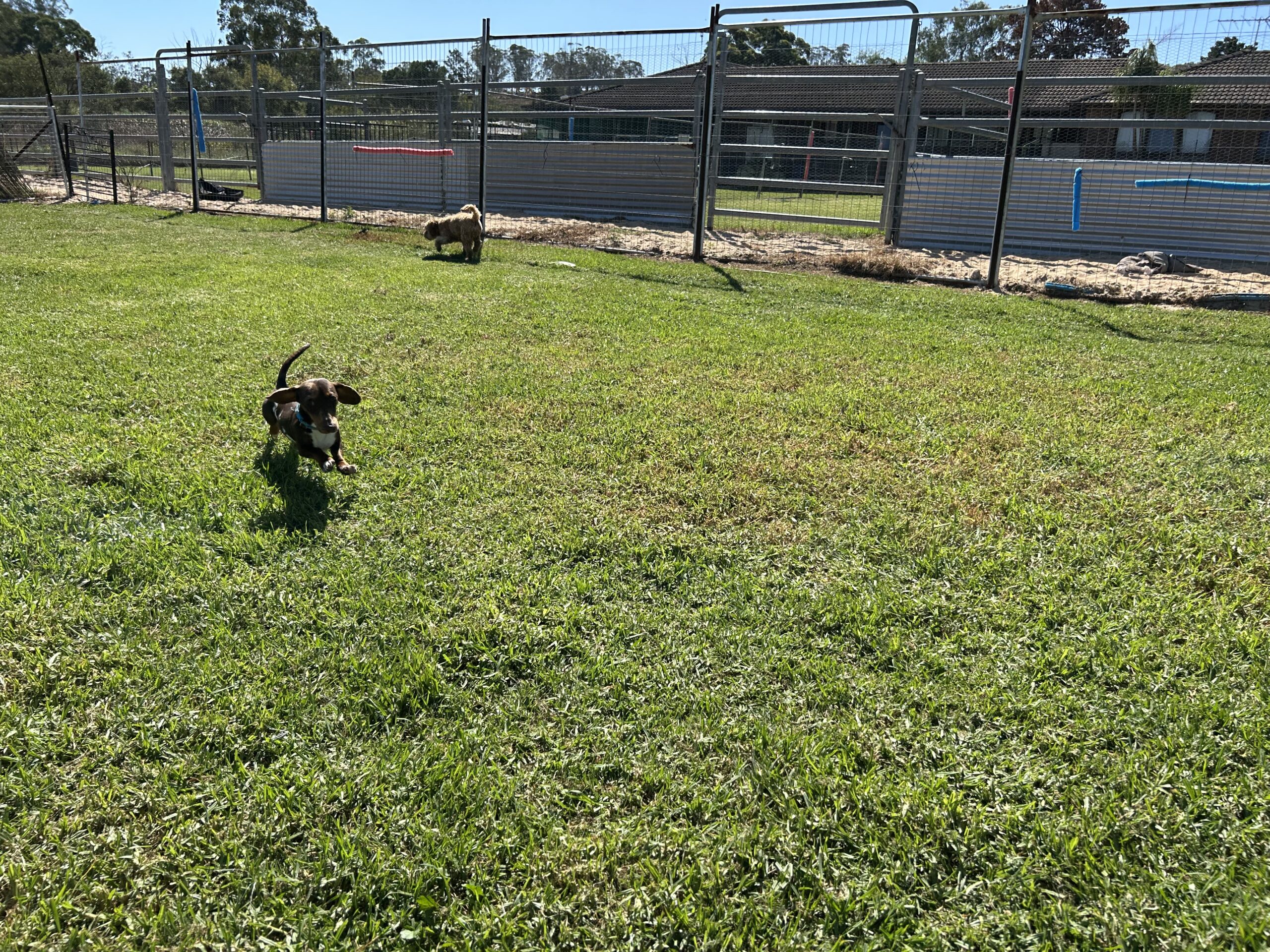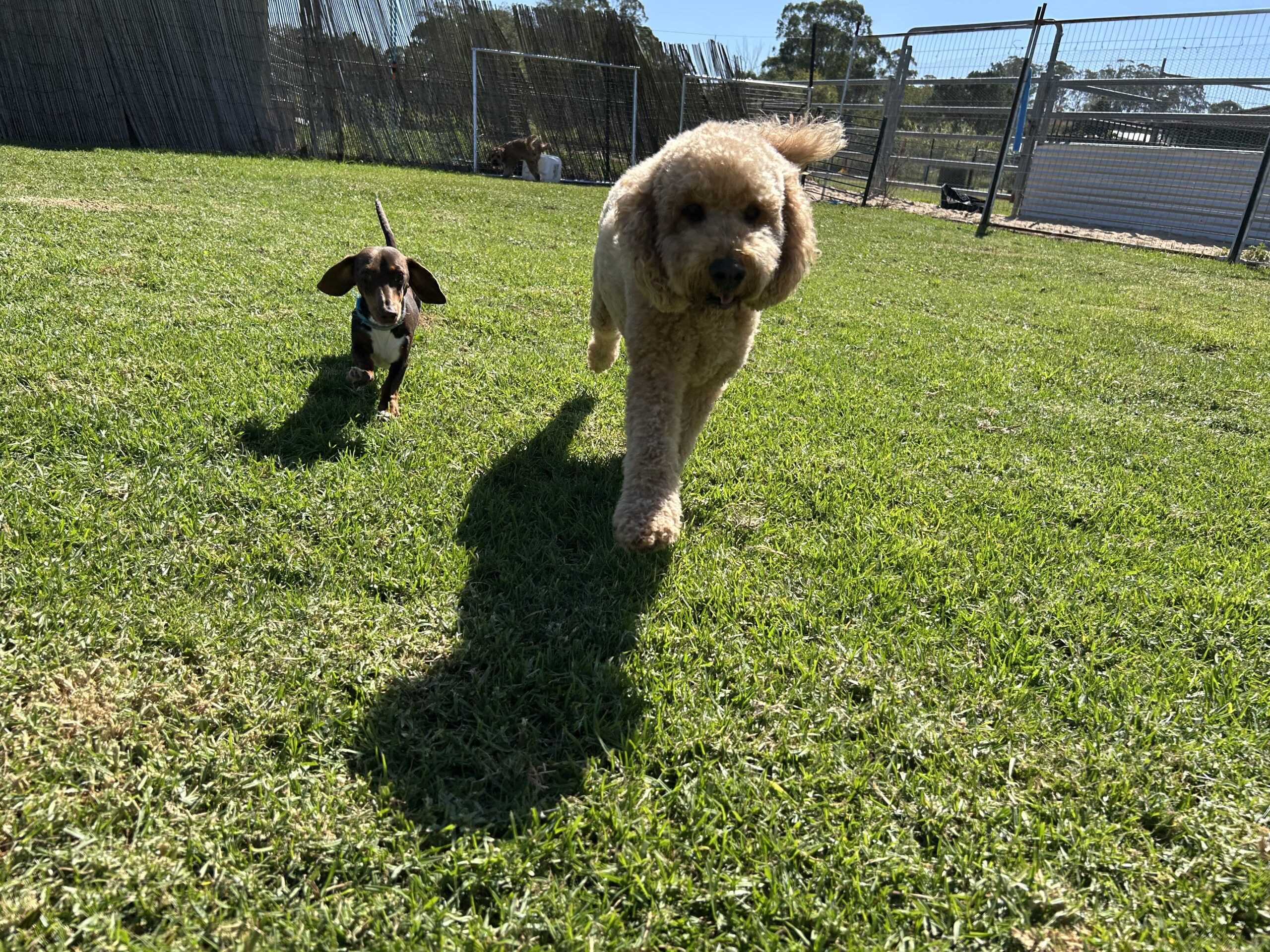Dog Daycare Destructive Behaviour: Peaceful Solutions for Home Protection

Dog daycare destructive behaviour intervention programs address the root causes of household damage, transforming problematic chewing, digging, and scratching into appropriate outlet behaviours.
Key Takeaways: Preventing Home Destruction Through Daycare
Essential Prevention Benefits
Why It Matters
- Dog behaviour improvement programs target underlying causes
- Preventing dog boredom prevents boredom-based destruction
- Appropriate dog daycare exercise benefits reduce frustration-based damage
- Doggy daycare socialisation fulfillment prevents attention-seeking destruction
- Consistent daycare develops predictable daycare boundary enforcement
- Outlet training teaches appropriate alternatives to destruction
- Professional monitoring identifies early destruction tendencies
- Gradual recovery transitions skills from daycare to home
“The Hidden Cost: Is Your Furniture Paying the Price for Your Dog’s Unmet Needs?”
Have you returned home once too often to discover your previously intact possessions transformed into a landscape of fabric confetti, wood splinters, and foam fragments? Many frustrated owners attribute destructive tendencies to spite, boredom, or poor training when they actually represent sophisticated communications about profound unmet needs.
Research reveals that destructive behaviours typically stem from five primary drivers: understimulation, excess energy, anxiety, attention-seeking, and inappropriate targeting of natural behaviours. Even more revealing, a comprehensive study from the University of Melbourne found that 83% of destructive dogs showed significant improvement when their underlying needs were systematically addressed—without using punishment or suppression techniques.
The financial impact is equally significant: insurance data shows the average Australian household with a destructive dog suffers approximately $2,700 in annual damage. The good news? Quality daycare prevents home destruction through evidence-based interventions that address the psychological drivers behind problematic chewing, digging, and scratching.
Daycare Prevents Home Destruction Through Systematic Need Fulfillment
Dog daycare destructive behaviour programs operate on a fundamental behavioural principle: destruction represents misdirected natural behaviours that require appropriate outlets rather than suppression. Unlike punishment approaches, quality daycare prevents home destruction by implementing sophisticated need-fulfillment and redirection protocols.
“Most owners misunderstand the complex communication systems that destructive behaviour represents,” explains Dr. Emma Richardson, veterinary behaviourist. “Effective intervention doesn’t just stop destruction—it addresses the underlying needs while teaching more appropriate outlet behaviours.”
Premier dog daycare destructive behaviour facilities implement evidence-based strategies including:
- Comprehensive behavioural assessment identifying specific destruction motivators
- Custom intervention protocols based on individual destructive patterns
- Strategic fulfillment of needs commonly underlying household damage
- Appropriate outlet training for natural chewing, digging, and scratching drives
- Physical exercise calibrated to individual energy requirements
- Mental enrichment preventing boredom-based destruction
- Professional consistency developing sustainable alternative behaviours
These aren’t random activities but carefully orchestrated behavioural interventions designed by canine behaviour specialists. The improved outlet behaviours developed through dog daycare destructive behaviour programs transfer directly to household preservation at home.
Daycare Prevents Home Destruction: The Behavioural Science of Redirection
Dog daycare destructive behaviour programs utilise cutting-edge understanding of canine cognition to create balanced behavioural patterns. Research from the University of Sydney’s Animal Behaviour Sciences department found that structured daycare intervention reduced destructive incidents by 76% compared to simple confinement or punishment approaches.
During professionally designed dog daycare destructive behaviour interventions, your dog’s behavioural systems undergo sophisticated recalibration:
- Development of appropriate outlet behaviours for natural chewing urges
- Formation of constructive alternatives to tension-relieving destruction
- Installation of enrichment-seeking rather than destruction-seeking patterns
- Satisfaction of underlying needs preventing frustration-based damage
- Establishment of clear behavioural boundaries and expectations
“These benefits of doggy daycare techniques create fundamental changes in how dogs express their natural drives,” notes canine behaviour specialist Dr. James Wilson. “In quality dog daycare destructive behaviour programs, we’re not just stopping damage—we’re creating more appropriate channels for innate behaviours.”
Is Your Dog’s Destruction Signalling Deeper Issues? Take This Assessment:
- Does your dog engage in destruction primarily when left alone?
- Does your dog destroy items when you’re present but not engaging with them?
- Does destruction increase during high-stress periods or changes in routine?
- Does your dog seem particularly focused on certain destruction types (chewing, digging, etc.)?
- Has your dog’s destructive behaviour persisted despite increased physical exercise?
If you answered “yes” to three or more questions, your dog likely displays destruction stemming from specific unmet needs—precisely the behaviours that specialised dog daycare destructive behaviour programs address through structured intervention.
Specialized Techniques for Reducing Destruction at Quality Daycares
Premier dog daycare destructive behaviour facilities implement evidence-based protocols designed specifically for damage-prone dogs. These aren’t punitive programs but sophisticated behaviour modification interventions created by canine specialists.
“The difference between suppression and proper redirection training is profound,” explains Dr. Sarah Williams, canine behavioural psychologist. “Proper dog daycare destructive behaviour programs systematically address the underlying motivations rather than simply trying to prevent the destruction itself.”
Leading daycare prevents home destruction programs feature techniques such as:
Drive Satisfaction Scheduling
Strategic fulfillment of specific natural behaviours that commonly manifest as household destruction—creating appropriate outlets for chewing, digging, shredding, and other potentially destructive drives.
Anxiety-Related Destruction Intervention
Carefully managed protocols addressing the emotional insecurity often underlying separation-related destruction—building confidence that prevents panic-based damage during alone time.
Alternative Behaviour Installation
Structured activities teaching dogs specific non-destructive methods to meet their needs—providing effective outlets that replace inappropriate targeting of household items.
Environmental Enrichment Training
Systematic education helping dogs recognise and appropriately use enrichment opportunities—developing the ability to self-occupy constructively rather than destructively.
Case Study: Max’s Transformation Through Destruction Intervention
Before: Max, a 2-year-old Labrador/Staffy cross, represented a classic destructive case. His family reported wholesale destruction of furniture, doorframes, and personal items when left alone, despite ample toys and lengthy morning walks. Multiple trainers had suggested various punishment techniques and increased confinement, yet his behaviour continued to worsen, creating significant financial strain and family tension.
The Dog Daycare Destructive Behaviour Program: Max began attending a specialised daycare program three days weekly. Staff conducted an initial assessment and created a personalised intervention protocol:
- Week 1: Comprehensive needs assessment identifying frustration and anxiety as primary destruction drivers
- Weeks 2-3: Installation of appropriate chewing outlets matching his specific oral preferences
- Weeks 4-6: Graduated alone-time practice with enrichment training
- Ongoing: Transfer of coping techniques to home environment with parent training
Measurable Results After Eight Weeks:
- 92% reduction in destruction incidents at home
- Complete elimination of anxiety-based destruction
- Development of appropriate self-occupation with suitable chew items
- Successful transition to being left alone for up to 6 hours without damage
“The transformation in Max’s behaviour was remarkable,” reports his owner, Jennifer. “The dog daycare destructive behaviour approach completely changed our lives. The staff didn’t punish his destruction—they systematically addressed why he felt the need to destroy while teaching him better ways to meet those needs. We’ve saved thousands in potential damages and finally have peace of mind when leaving him alone.”
Signs Your Dog is Developing Better Habits Through Quality Daycare
Not all dog daycare facilities provide genuine destructive behaviour intervention. Many simply contain dogs without addressing underlying behavioural needs. To determine whether your dog daycare destructive behaviour program is providing true benefits, monitor these evidence-based indicators:
- Your dog shows decreased interest in previously targeted destruction items
- Appropriately provided outlet objects are increasingly utilised
- Destruction incidents become less severe when they do occur
- Your dog demonstrates greater ability to self-occupy appropriately
- Anxiety-related behaviours preceding destruction diminish
- Your dog engages more readily with appropriate enrichment
- Recovery after potentially triggering events becomes quicker
Dr. Thomas Chen, veterinary behaviourist, explains: “Effective dog daycare destructive behaviour intervention produces distinct behavioural changes that manifest as improved decision-making around natural drives. When dogs receive proper outlet training, the transformation extends beyond simple damage prevention—they develop fundamental skills in expressing needs appropriately.”
Destruction Prevention Comparison: Punishment vs. Need-Fulfillment Approach
| Destructive Behaviour Needs | Punishment-Based Approaches | Dog Daycare Destructive Behaviour Benefits |
|---|---|---|
| Underlying cause identification | Ignores root needs driving destruction | Systematically assesses and addresses specific motivators |
| Long-term effectiveness | Temporary suppression often followed by resurgence | Creates lasting behaviour changes through need fulfillment |
| Emotional impact on dog | Often creates frustration or anxiety | Improves overall wellbeing by addressing actual needs |
| Alternative behaviour development | No replacement behaviours installed | Teaches appropriate alternatives to fulfill natural drives |
| Future prevention | Requires continued punishment | Develops self-regulation and appropriate choices |
| Owner-dog relationship | Often damages trust and connection | Strengthens relationship through understanding and support |
| Generalisation to home environment | Poor transfer from training to real situations | Sustainable behaviour changes that maintain at home |
Long-Term Behavioural Benefits of Destruction-Prevention Daycare
Behavioural benefits of daycare programs focused on need fulfillment offer enduring behavioural benefits that extend throughout your dog’s lifetime. Recent research from the University of Queensland’s Canine Behaviour Centre revealed that dogs receiving structured outlet training maintained their improved behavioural patterns even when facing novel stressors months after program completion.
“We now understand that appropriate redirection training creates permanent changes in behavioural decision-making,” explains clinical animal behaviourist Dr. Robert Thompson. “The skills developed through these programs fundamentally alter how dogs express their natural drives and respond to challenging circumstances.”
Evidence-based dog daycare destructive behaviour benefits include:
- Development of appropriate drive expression replacing destructive tendencies
- Formation of constructive problem-solving skills when facing frustration
- Enhanced emotional regulation during potentially triggering experiences
- Improved ability to self-occupy appropriately when alone
- Better generalisation of appropriate behaviours across environments
These behavioural benefits accumulate over time, with each dog daycare destructive behaviour session contributing to your dog’s decision-making skills and appropriate expression of natural drives.
How Different Destruction Types Benefit from Specialised Daycare
Dog daycare destructive behaviour programming recognises that destructive tendencies require individualised approaches based on the specific type, triggers, and underlying motivations. Leading facilities conduct thorough assessments to customise intervention protocols:
Separation-Related Destroyers
Dogs who damage items specifically when left alone need dog daycare destructive behaviour programs emphasizing graduated confidence building and appropriate alone-time enrichment to prevent anxiety-based destruction.
Attention-Seeking Destroyers
Dogs who destroy items when owners are present but not engaging require daycare prevents home destruction approaches focusing on appropriate attention-requesting behaviours and self-occupation skills.
Chewing/Oral Destroyers
Dogs with excessive oral fixation benefit from dog daycare destructive behaviour programs incorporating targeted chewing outlet training and oral satisfaction techniques to redirect natural chewing drives appropriately.
Frustration-Based Destroyers
Dogs who destroy when unable to access desired resources or activities need comprehensive dog daycare destructive behaviour protocols addressing frustration tolerance and alternative satisfaction methods.
Destruction-Prevention Daycare Evaluation Checklist
Not all facilities claiming to help destructive dogs truly understand behaviour modification. Use this evidence-based checklist when evaluating potential dog daycare destructive behaviour providers:
- Staff with specific training in canine behaviour (not just general care)
- Individual assessment protocols identifying specific destruction motivators
- Clear understanding of the different functional types of destructive behaviour
- Positive approach focusing on need fulfillment rather than punishment
- Customised intervention plans based on specific destruction patterns
- Professional monitoring and documentation of behavioural changes
- Regular owner communication regarding progress and home implementation
- Emphasis on transferring improved behaviours to the home environment
Consider exploring choosing quality daycare guidelines when making your selection.
Critical Questions for Destruction-Prevention Daycare Providers
When interviewing potential dog daycare destructive behaviour facilities, ask these revealing questions to assess their expertise:
- “How do you assess the specific motivations driving my dog’s destructive tendencies?”
- “What protocols do you implement for teaching appropriate outlet behaviours?”
- “How do you address the underlying needs driving destructive behaviour?”
- “What systems do you have for transferring improved behaviours to our home?”
- “How do you measure progress in reducing destructive tendencies?”
- “What credentials do your staff hold specifically related to behaviour modification?”
The facility’s ability to provide substantive, detailed responses reveals their true commitment to behaviour development versus facilities offering simple supervision.
Conclusion: Transform Destruction into Appropriate Expression
Dog daycare destructive behaviour programs offer a sophisticated alternative to simplistic punishment approaches that often worsen rather than resolve destructive tendencies. By providing customised behaviour modification protocols, these specialised programs address the underlying motivations driving problem destruction rather than merely attempting to suppress the symptoms.
Each dog daycare destructive behaviour session creates measurable improvements in appropriate drive expression. The cumulative effect builds a dog who satisfies natural needs appropriately rather than destructively—transforming their fundamental approach to natural canine behaviours.
“When we examine the behavioural evidence,” notes Dr. Jessica Moore, veterinary behaviourist, “the conclusion is clear: structured outlet training through specialised dog daycare destructive behaviour programs represents the most effective intervention for chronically destructive dogs.”
Your home and possessions deserve protection, but your dog also deserves constructive ways to express their natural drives. Schedule a behavioural assessment today to discover how a quality dog daycare destructive behaviour program can transform your dog’s expression patterns while preserving your household.
External Links:
- Canine Boarding Lodge
- Mobile Dog Grooming Services
- Canine Glamour Facebook
- Canine Glamour Instagram
- Canine Glamour TikTok
- Canine Boarding Lodge Facebook
Follow for more: For more grooming tips visit: FB: Canine glamour Instagram: Canine glamour TikTok: Canine Glamour For more boarding tips visit: FB: Canine boarding lodge



